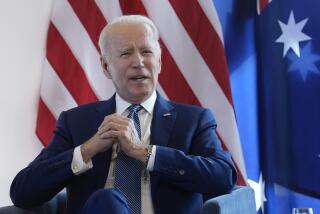TUMULTUOUS TIMES FOR WORLD TRADE : Financial Services Talks Are Headed for WTO Breakdown : Commerce: U.S. is holding out for more protection of investments in foreign countries. Other nations voice shock and dismay.
GENEVA — Negotiations to make it easier for banks, insurance companies and other financial institutions to do business around the world are on the verge of a breakdown, facing what the chief U.S. negotiator called “too big a gulf” to be narrowed before a deadline tonight.
As the United States held out for stronger protection of investments in foreign countries, negotiators faced a stalemate that has turned into a replay of the cliffhanger negotiations here a year and a half ago that brought agreement only at the last minute on a massive revision of the rules of global trade.
Those talks ended without agreement on issues related to financial services, and negotiators ended up pushing off the table the intractable questions about rules for financial trade.
Now, working against a new deadline, negotiators are facing a threat by the Clinton Administration to go it alone--to pull out of the talks at least temporarily and begin negotiating separate agreements with individual countries.
Going into the final 24 hours of talks, an Administration official in Washington said an immediate solution “looks unlikely.” But the outlook was similarly bleak just two days ago for the U.S.-Japan auto agreement that was completed here Wednesday.
U.S. withdrawal is seen as a potentially weakening blow for the young World Trade Organization, which is overseeing the talks. Renato Ruggiero, director general of the trade body, scheduled a final meeting this morning to seek an agreement. But diplomats voiced dismay at the U.S. position.
European Union Ambassador Jean-Pierre Leng told the committee he was “confused and perplexed.” Japan expressed deep disappointment, and Australia described the decision as “a bombshell,” according to diplomats present.
There was no immediate comment from Ruggiero, who had set a successful conclusion of the negotiations as a prime target and called this outcome more important to the world than that of the U.S.-Japan auto dispute.
One senior WTO official said the development marked “a very black day” for the organization, which was launched at the start of this year amid hopes that it would usher in a new era of cooperation under agreed rules covering most areas of trade.
At Thursday night’s negotiating session, the U.S. representative, Assistant Treasury Secretary Jeffrey Shafer, said the United States would insist on maintaining its right to limit the U.S. operations of foreign financial institutions whose home governments do not protect the rights of U.S. investors and financial institutions in their countries.
In an interview after he spoke to the WTO financial services negotiating committee, Shafer said, “Our objective here is to open markets, not close markets.” But, he said, “we reserve the right to reciprocate against countries denying us access.”
The high profile of the talks reflects the fact that the importance of financial services has grown by leaps and bounds in recent years as the globalization of the economy takes hold and investors in Burbank, for example, seek to capitalize on opportunities offered in Bangkok.
The Administration sees the prospect of opening financial markets as a top goal in its continuing effort to complete the widest revision of global trade regulations since the end of World War II.
Treasury Secretary Robert E. Rubin has been adamant in insisting that the United States will not enter the agreement without a firm commitment that its investors’ overseas holdings will be protected from expropriation--a commitment that Administration officials say several nations--Malaysia, Singapore and Indonesia among them--are reluctant to give.
Rubin has wide backing from Republicans and Democrats on Capitol Hill for withholding U.S. approval of any agreement that does not protect U.S. investors, particularly in the emerging markets of Southeast Asia.
Despite the U.S. position, international trade officials remained hopeful that a compromise would be found in the final hours--and that if not, the talks would continue beyond the deadline.
“It will still be in play. We are not going to let this go,” one trade official here said.
The chief stumbling block appears to be the United States’ demand that foreign investors be given the same treatment as domestic investors--national treatment, in the parlance of trade negotiators.
More to Read
Sign up for Essential California
The most important California stories and recommendations in your inbox every morning.
You may occasionally receive promotional content from the Los Angeles Times.










